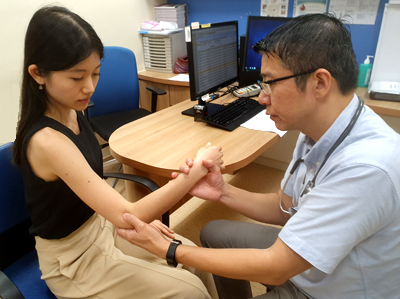Pharmacist Lim Teong Guan overcame his fears to become one of Singapore’s first pharmacists certified to prescribe.
Lim Teong Guan was among the first pharmacists in Singapore to be licensed by MOH to prescribe medicine without having a doctor sign off, under the collaborative prescribing scheme in 2018.
Instead of jumping at the opportunity to extend his professional practice, Teong Guan was initially resistant to do what no pharmacist in Singapore had done before.
Is it unusual for pharmacists to be allowed to prescribe medicine?
Pharmacists in the US and UK have been prescribing in a collaborative manner for at least 15 to 20 years. So collaborative prescribing is not a new concept. I would say it is a global standard for pharmacy.
Tell us about your journey towards the top of your licence?
I started out as a junior pharmacist 18 years ago doing inventory and dispensing. After a few years, I progressed to counselling patients about medication in Asthma Clinic. I then advanced to being allowed to order repeat medication, but the doctor still had to countersign. Finally, in 2018, MOH extended the prescribing right to senior pharmacists. We are certified to take patient history, perform physical examination, order tests, discuss treatment plan with the patient, and provide medication counselling in addition to prescribing medication.

As a certified collaborative prescriber, Pharmacist Teong Guan can perform simple physical examinations such as joint examination on patients.
What were your thoughts when you heard of the chance to upgrade?
No one volunteered when SGH Pharmacy called for senior pharmacists to be upskilled to collaborative prescribers. Simply because no pharmacist has ever done this before. I was concerned about the professional liability… what would happen to me if I prescribed wrongly?
Also, I had to complete an intensive three-month training programme on top of my existing work. To make matters worse, this programme has a physical examination component which was not in my pharmacist training. And doctors take many years to complete the physical examination curriculum. But I was expected to complete this in three months? I thought that was really challenging. And then there was the matter of pride. After 18 years of practice, if I went and I failed - no face.
That’s why initially I adopted a wait-and-see approach…see who will jump into the sea first and still swim.
Why did you take the plunge?
I was overseeing Outpatient Pharmacy then, and I felt I had to take this leap and lead by example. I cannot ask my team to swim without me swimming first. And to use driving as an analogy, I cannot wait for all the lights to turn green to start driving. I told myself, let’s start driving first. If there’s a red light, I stop. And I adjust along the way. Also every challenge is an opportunity. This is an opportunity to elevate the pharmacy profession in Singapore so that we can practice to the full extent of our education and training.
So how did you manage to complete the training?
I got comprehensive training over 3 months. As part of the programme, I managed to get a few doctors whom I worked closely with to train me, because like a GP, I will sit in a clinic and see patients. Over 3 months, I was taught how to take patient history, perform physical examinations, and present the finding to physicians. Also, Senior Resident doctors, Medical Officers and Advanced Practice Nurse helped to arrange sessions with their patients for me to hone my physical examination skills. All this gave me confidence to do my new role.
Do you enjoy your work more now?
I have more job satisfaction now. As a certified collaborative prescriber, I am able to operate at the top of my licence. Now I can perform simple physical examination, take patient history, and come up with differential diagnosis. And having received more extensive clinical training, I am able to give a more comprehensive presentation of my patients during discussions with my collaborative physician. All these translate to better patient care.
And most of my patients have my contact number. So they can call me with questions on their condition or medication anytime.
I’m sure you have been able to impact the doctor’s work in some way, too?
They refer less complicated cases to me. I also help doctors gather history from patients who require more immediate attention, for example, for mild side effects from the medication. This saves the doctor quite a bit of time, which frees them up to focus on more complicated cases.
We love mail! Drop us a note at [email protected] to tell us what you like or didn’t like about this story, and what you would like to see more of in LighterNotes.
